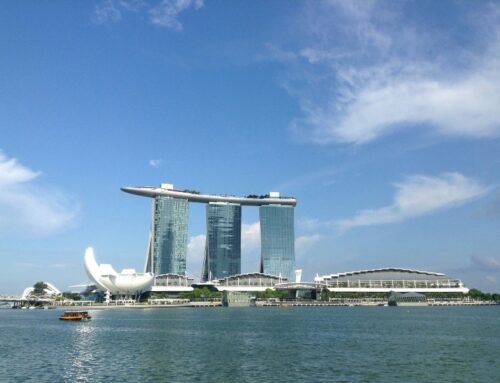Singapore is a pivotal hub for global trade, especially for transactions spanning the eastern and western time zones. As per the latest World Trade Organization statistics, Singapore ranks as the 14th largest merchandise exporter globally, boasting a trade-to-GDP ratio of 404.9%. This guide is designed to assist those looking to establish a trading company in Singapore.
Key Highlights of Singapore’s Trade Ecosystem
Singapore is home to approximately 3,000 logistics and supply chain management companies. The country offers traders access to 200 shipping lines connected to 600 ports in over 120 countries. The ports, equipped with state-of-the-art technology and managed by highly-trained personnel, ensure efficient handling of container loads and other cargo services. The Changi Airfreight Centre provides a 24-hour service centre for airlines, shippers, cargo agents, and consignees, further enhancing the efficiency of cargo handling.
Overview of Import/Export Procedures in Singapore
Singapore’s dominance in the import/export sector is underpinned by well-defined procedures, encompassing the following aspects:
- Opening a Customs Account: Required for all importers and exporters.
- Licensing and Permits: Necessary for various goods.
- Types of Goods: Specifies which goods can be imported/exported.
- Taxes and Fees: Includes customs duties and GST.
- Trade Financing: Options for funding trade activities.
- Cargo Clearance: Procedures for clearing imported/exported goods.
- Storage Options: Details on goods storage facilities.
Steps to Start a Trading Business in Singapore
Step 1: Incorporate a Trading Company To initiate a trading business, you need to incorporate a company.
Step 2: Register with Singapore Customs All importers and exporters must activate their account with Singapore Customs before engaging in trade. Account activation is typically processed within 1-2 working days upon application submission, resulting in a Customs approval letter valid for the company’s lifetime.
Step 3: Apply for Licenses and Permits
- For All Goods:
- IN Permit: Required for importing all goods (controlled and non-controlled) via TradeNet®.
- OUT Permit: Required for exporting all goods. Controlled goods or those transported by rail or road need the permit before export; non-controlled goods transported by sea or air require the permit within three days of export.
- For Controlled Goods: Additional permits are needed from relevant Controlling Agencies. Examples include cigarettes, drugs, petrochemicals, animals, and food products.
- For High-Technology Items: An Import Certificate and Delivery Verification (ICDV) may be required for specific high-technology items subject to export control.
- For Strategic Goods: A Strategic Goods Control (SGC) TradeNet Permit is necessary for the export, transshipment, or transit of strategic goods.
Special scenarios such as the import/export of trade samples valued under S$400 on the CIF value may proceed without a permit.
Import/Export of Controlled Goods
The import and export of certain goods in Singapore are regulated by specific Controlling Agencies. These goods, known as controlled goods, require special permits in addition to the standard IN and OUT Permits. Permit applications can be submitted through the TradeNet® system or via your freight forwarder or cargo agent for processing and approval. Examples of controlled goods include cigarettes, tobacco products, drugs, petrochemicals, animals, and food products.
Import of High-Technology Items
High-technology items often require export control compliance by the exporting country. Importers in Singapore might need to provide an Import Certificate and Delivery Verification (ICDV), which can be obtained from Singapore Customs. These items must be imported directly into Singapore without being diverted to other countries.
Export, Transshipment, or Transit of Strategic Goods
For the export, transshipment, or transit of strategic goods, a Strategic Goods Control (SGC) TradeNet Permit is required. Regulated by the Strategic Goods (Control) Act, this includes all goods and technology potentially used for weapons of mass destruction.
Export of Local Goods
Exporters may need to provide a Certificate of Origin (CO) to confirm that their goods are manufactured in Singapore. There are two types of COs:
- Ordinary Certificates of Origin: Certify that products are wholly obtained, produced, or manufactured in Singapore.
- Preferential Certificates of Origin: Allow buyers to claim preferential tariff treatment under various trade agreements.
Applications for COs can be made through TradeNet® or via your freight forwarder or cargo agent.
Taxes and Fees
Customs and Excise Duty Goods manufactured or imported into Singapore that are subject to customs and/or excise duties are known as dutiable goods. These include intoxicating liquors, tobacco products, motor vehicles, and petroleum products. Duties are either ad valorem (percentage of the Customs value) or specific rate (amount per unit).
Goods and Services Tax (GST) Imported goods intended for local consumption are subject to a prevailing GST of 9%, administered by the Inland Revenue Authority of Singapore (IRAS). GST is calculated on the CIF value plus all duties and other costs. GST relief is available under certain conditions for wine used at approved events and exhibitions.
Singapore Customs Fees Singapore Customs charges procedural and administrative fees, payable via GIRO for direct deductions from your bank account.
Trade Financing and Insurance
Letter of Credit (LC) A Letter of Credit ensures payment to the exporter is guaranteed by the buyer’s bank. It secures the exporter’s payment before shipment and the buyer’s payment after receiving the goods. Additional financing options based on LC include Back To Back LC, Trust Receipt, and Packing Credit.
Loans Banks in Singapore offer competitive trade finance services such as:
- Overdraft: Allows overdrawing up to a set limit.
- Revolving Line of Credit: Provides a predetermined amount of funds at a fee.
- Term Loans: Loans against collateral.
- Transaction Loan: Loans based on confirmed orders.
- Inventory Financing: Loans against unsold inventory.
- Factoring Loans: Immediate payment against outstanding invoices, with a fee for collection.
Insurance Trade credit insurance protects companies against non-payment by buyers due to commercial or non-commercial risks. International Enterprise Singapore offers attractive trade credit insurance through its TCI Programme.
Goods Deposition and Storage in Free Trade Zones
Free Trade Zones (FTZs) represent designated areas within the air and seaports of Singapore where the imposition of duties and Goods and Services Tax (GST) on imported goods is temporarily suspended. Duties and taxes are only settled upon the departure of goods from the FTZs and their entry into the customs territory for consumption. Most dutiable goods can be housed within the FTZs, with the exception of liquors and cigarettes. For businesses involved in importing goods for subsequent export (re-exporting), FTZs offer considerable advantages to cash flow, as duties and GST on imports are deferred until goods exit the FTZs.
It’s imperative to note that goods arriving via rail and road are not stored in FTZs and are subject to duties and taxes.
Licensed and Zero-GST Warehousing Facilities
Dutiable goods can be stored in Licensed Warehouses, where GST and duties remain suspended until the goods are withdrawn from the premises for local consumption. Non-dutiable goods can be stored in Zero-GST Warehouses, with GST payments suspended until the goods are removed from the premises for consumption in the local market.
Goods Clearance Procedures
Immigration and Checkpoint Authority (ICA) officers oversee inspections of vehicles, cargo, and individuals entering the country, referring trade and customs matters to Singapore Customs for further action. Clearance procedures vary depending on the type of cargo and mode of transport.
Export Clearances for Conventional and Containerized Cargo
For dutiable and controlled goods, obtaining a Customs OUT Permit from Customs or the Controlling Authority is necessary before export. The Customs OUT Permit must be presented to ICA officers at the exit checkpoint for cargo clearance. The authenticity of the Customs seal on the cargo, if applicable, is verified by ICA officers before cargo release.
For non-dutiable and non-controlled goods exported by air or sea, traders can clear the cargo through the checkpoint first and declare the Customs OUT permit within three days of export. For road exports, the Customs OUT permit should be presented during export clearance.
Import Clearances for Conventional Cargo
For imports, presenting the Customs IN Permit (or an import authorization) along with supporting documents (such as invoice, packing list, bill of lading, etc.) to the ICA officers at the entry checkpoint is necessary for cargo clearance.
For goods imported for local consumption, duties and/or GST must be settled before the goods can be released for entry.
Import Clearances for Containerized Cargo
The procedure for clearance of containerized cargo differs from that of conventional cargo. There are two types of containerized cargo:
- Full container load (FCL) – a container with goods for one consignee or from one consignor.
- Less than full container load (LCL) – a container with goods for more than one consignee or from more than one consignor.
Before the removal of containers from FTZs, obtaining the relevant Customs permits is a prerequisite.
Procedure for FCL Containers
FCL containers are typically not unloaded in the FTZ. Containers requiring Customs examination are sealed at the respective FTZ out-gates. After sealed containers are transported out of the FTZ, consignees or their transport agents should arrange with Singapore Customs for supervision of container unloading. Customs seals placed on containers at the time of import should not be tampered with without the supervision or written permission of Singapore Customs.
Containers not requiring Customs examination will be granted SNR (Sealing Not Required) facilitation and released by ICA officers without being sealed. Unsealed containers may be unloaded at any time without supervision from Singapore Customs.
Procedure for LCL Containers
LCL containers are unloaded in the FTZ and cleared through the FTZ out-gates as conventional cargo. No Customs supervision is required for the unloading of such containers in the FTZ.
If you need assistance with starting a trading business in Singapore, you may contact the Raffles Corporate Services corporate secretarial team at hello@rafflescorporateservices.com.
Yours sincerely,
The editorial team at Raffles Corporate Services







[…] hosts approximately 300 global trading companies, operating under the International Enterprise Global Traders Program, which includes some of the […]